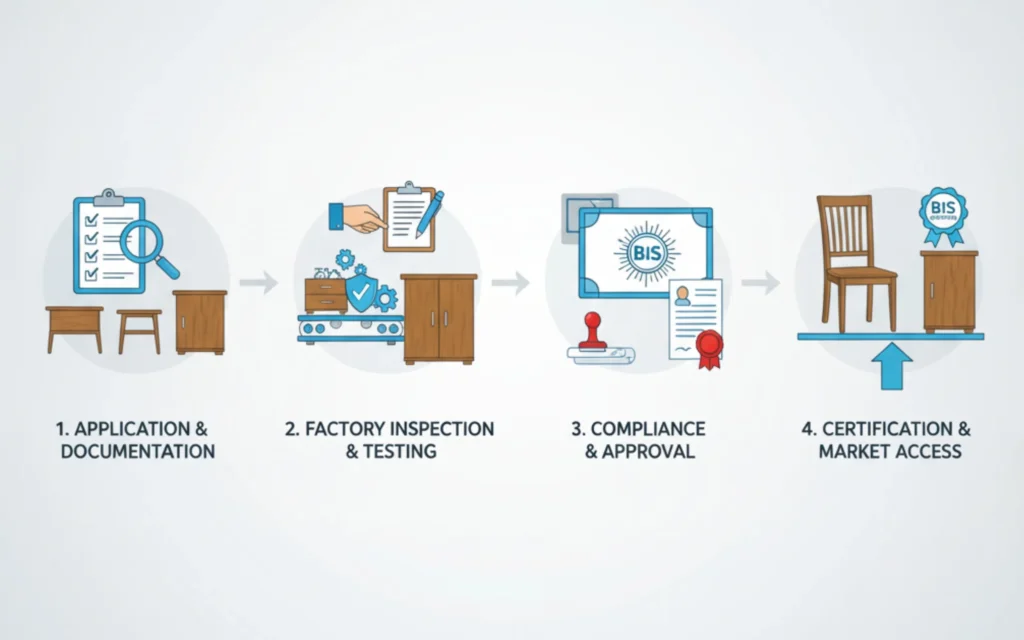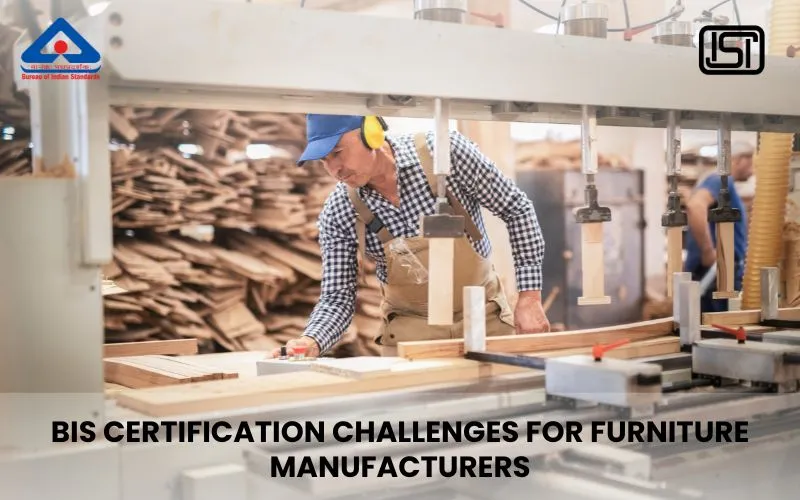In India’s competitive furniture industry, ensuring product quality, safety, and compliance is more important than ever. This is where BIS Certification for Furniture Industry plays a vital role. The Bureau of Indian Standards (BIS) is the national body responsible for maintaining product standards, and obtaining BIS certification assures manufacturers and customers alike that furniture products meet rigorous safety and quality benchmarks.
For furniture manufacturers, following the process of BIS certification not only guarantees compliance with Indian regulations but also elevates brand credibility in the market. Certified products inspire greater trust among consumers, reduce the risk of legal issues, and enhance the overall reputation of the business. Additionally, BIS-certified furniture gains an advantage in international trade, as global buyers often prefer products that comply with recognized quality standards.
To understand the certification in detail, manufacturers can refer to our Complete Guide to BIS Certification for Furniture in India for a comprehensive overview. Meanwhile, exploring the Benefits of BIS Certification for Furniture Manufacturers in India can help businesses appreciate the tangible advantages of certification, from market trust to export opportunities.

Step-By-Step Process of BIS Certification
Step 1 – Check Eligibility for BIS Certification
Before applying, it’s crucial to determine if your furniture products require BIS certification. Generally, all commercially manufactured furniture intended for sale in India must comply with BIS standards. Eligibility depends on factors like the type of furniture, materials used, and whether it falls under mandatory certification categories. Ensuring your products meet these requirements prevents delays and increases the chances of approval.
Step 2 – Prepare Required Documents
Once eligibility is confirmed, the next step is to gather all documents required for BIS certification. Typical documents include:
- Company registration certificate or business license
- Details of manufacturing units
- Product specifications and material composition
- Quality control procedures and internal testing records
Previous certifications or test reports (if any)
Having these documents ready ensures a smooth application process and minimizes follow-up requests from BIS.
Step 3 – Submit Application to BIS
The BIS application can be submitted online through the BIS portal or offline at designated offices. Along with the application, applicants must pay the applicable fees, which vary depending on the type and number of products. Accurate submission of forms and documents is critical to avoid unnecessary delays in processing.
Step 4 – Product Testing & Inspection
After submission, BIS conducts rigorous testing and inspection. This involves:
- Laboratory testing of furniture samples to verify compliance with BIS standards
- On-site factory inspections to ensure production processes meet quality norms. Successfully passing these tests is part of the stepwise BIS approval and confirms that the products are safe and reliable.
Step 5 – Review & Approval by BIS
BIS evaluates the submitted application, documents, and test reports to ensure complete compliance. The review typically takes a few weeks, depending on the complexity of the products. Once approved, BIS communicates the decision and provides instructions for the next steps. Keywords: BIS certification timeline, BIS approval procedure for furniture.
Step 6 – Grant of BIS Certificate
After approval, the BIS certificate is issued with a specific validity period. Manufacturers must ensure timely renewal to maintain compliance. Certified furniture can display the official BIS mark, signaling quality and safety to consumers and increasing market trust.

Common Challenges During BIS Certification
While obtaining BIS certification for furniture is essential, many manufacturers face certain challenges that can delay approval or even lead to rejection. Being aware of these issues beforehand can help streamline the process and ensure smoother compliance.
1. Incomplete or Incorrect Documentation
One of the most common issues is submitting incomplete or inaccurate documents. Missing business licenses, product specifications, or quality control records can result in rejection. To avoid this, double-check all documents required for BIS certification before submission.
2. Non-Compliance with BIS Standards
Furniture products must strictly adhere to BIS standards for furniture. Using uncertified materials, skipping internal quality checks, or failing to meet safety norms can cause compliance issues. Conduct thorough internal testing to ensure your products meet BIS requirements.
3. Delays in Product Testing & Inspection
Laboratory testing or factory inspections may face delays if samples are improperly prepared or the facility is not inspection-ready. Prepare your manufacturing unit in advance and ensure all test samples accurately represent your products.
4. Misunderstanding Application Procedures
Errors during the BIS application process in India, such as incorrect form submission or missing fees, can slow down the approval timeline. Familiarize yourself with the process and follow BIS guidelines carefully.
5. Renewal & Validity Oversights
Even after approval, neglecting the timely renewal of the certificate can affect compliance status. Keep track of certificate validity and plan renewal well in advance.
By addressing these common challenges proactively, manufacturers can avoid delays, minimize BIS compliance issues, and secure certification efficiently.
Frequently Asked Questions (FAQs)
1: How long does BIS certification take?
The process of BIS certification generally takes between 4 to 8 weeks, depending on the type of furniture, completeness of submitted documents, and testing requirements. Timely submission of accurate documents and compliance with BIS norms can help speed up approval.
2: What documents are required for BIS certification?
Essential documents include:
Company registration or business license
Manufacturing unit details
Product specifications and material composition
Quality control procedure
Previous test reports (if applicable)
Ensuring all documents required for BIS certification are accurate and complete minimizes delays in the approval process.
3: Can small furniture manufacturers apply for BIS?
Yes, BIS certification is not limited to large companies. Small and medium-sized furniture manufacturers can also apply, provided their products meet the required BIS standards. Obtaining certification can boost credibility, increase consumer trust, and open opportunities for domestic and international sales.
Obtaining BIS Certification for the Furniture Industry is a crucial step for manufacturers who want to ensure quality, safety, and trust in their products. By following the step-by-step process of BIS certification, furniture businesses can not only comply with regulatory standards but also enhance their brand credibility and expand market opportunities, both domestically and internationally.
For a broader understanding of the certification and its requirements, check out our detailed Complete Guide to BIS Certification for Furniture in India. To explore the advantages it brings to your business, including increased consumer trust and export potential, read our blog on the Benefits of BIS Certification for Furniture Manufacturers in India.
At HomeCityOnline, we are committed to helping furniture manufacturers navigate the certification process smoothly. Start your BIS certification journey today and ensure your furniture stands out in terms of quality, compliance, and reliability.




